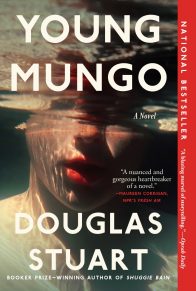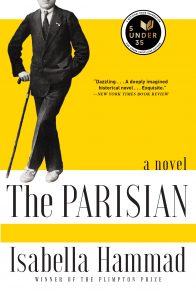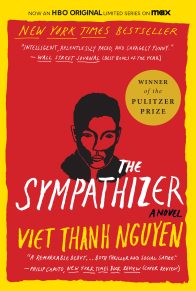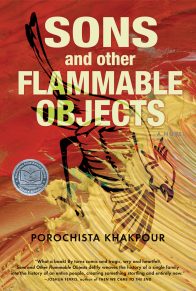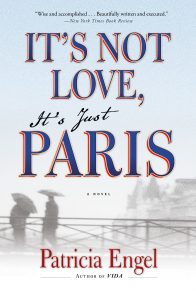3. Hammad writes of Sonia, “I may not have known what I expected to feel returning to Haifa, but I suppose I hoped for some circling back to my younger self” (p. 52). How does the Haifa Sonia returns to compare to the Haifa of her childhood? Do you think Sonia gets what she hoped for over the course of the book? Explain.
4. Haneen is technically not allowed to go visit her aunt and uncle in Ramallah because of her Israeli citizenship. Meanwhile, Mariam lives half the time in Ramallah so her son’s father can visit more often without having to get a permit to enter ’48. How does Sonia’s British passport impact her daily experience in Haifa and the West Bank, and her interpersonal relationships in each place?
5. Why does Sonia say that her uncle Jad was at least partly responsible for “the greater psychological allegiance of [their] family to the resistance” (p. 41) compared to other Palestinian families in Haifa? Uncle Jad became politicized later in life, while Sonia’s father Nabil was very politically active in his young adulthood. How did this shift in each brother’s political activity impact their relationship to each other, and their relationships to Sonia and Haneen?
6. How was each sister impacted by the experience of meeting Rashid, the hunger striker? Why do you think that Haneen withheld information about Rashid’s fate from Sonia, and why was Sonia so upset by this when she found out? What does this conflict reveal to us about Sonia and Haneen’s relationship?
7. How does Enter Ghost create a dialogue about art and resistance and, more specifically, theatre as political protest? What risks do Mariam and the actors take in order to put on the play and why do you think they are willing to take them?
8. In Chapter 5, Mariam and the actors discuss how Hamlet speaks to the Palestinian struggle. Sonia resists this interpretation—why do you think this is? Does the novel ultimately seem to answer the question of whether art can or should influence politics?
9. Why do you think the author made the choice to write specific sections of the novel in the format of a script? Why do you think Hammad chose the scenes she chose, and how do they compare or relate to other theatrical scenes in the book being acted out by Mariam’s company?
10. How does the author use this motif of the ghost to explore major themes of the book? How is ghost employed as symbol or metaphor to explore the past and various ideas of haunting or else being haunted? Who—or what—takes on the role of ghost in Hammad’s novel?
11. What causes the breakdown of familial relationships depicted in the book—in Sonia and Haneen’s extended family, and in Mariam’s family—and what seems to lead to family unity? While thinking about the recording that Jad made with her grandparents, Sonia muses: “Must every Palestinian story be a family story?” (p. 42). Does the novel ultimately answer her question?
12. Discuss the representation of mothers and motherhood throughout the book, from the hunger striker’s mother, to Mariam, to Sonia and Haneen’s own mother and grandmother. Do these women have anything in common? How does Sonia’s role as Gertrude to Wael’s Hamlet allow her to inhabit the role of motherhood?
13. How does Sonia’s childlessness, including the story of her miscarriage and abortion, offer a counterpoint that reveals both the burden on women to become mothers and the cultural treatment of women who do not have children? Why do you think Sonia chooses to share her story with Mariam? Were you surprised by Mariam’s reaction?
14. Hammad writes, “We were enacting a Palestinian cliché: coming to see the house the family had lost. Although, as Mariam pointed out, my case did not quite fit that mould” (p.185). What does the sale of Sonia’s grandparents’ house bring up for her?
15. Sonia acknowledges the necessity of journalism in getting news of their homeland out into the world but wonders if people pay more attention to stories about one or two people rather than thousands. Do you think this is true? What does the book ultimately suggest about bearing witness?
16. How would you characterize the relationship between Sonia and Haneen? When Sonia first arrives in Haifa she reflects that “My whole life I’d been aware of Haneen’s stronger moral compass; it made me afraid to confide in her until the very last moment, until I absolutely needed to” (p. 2). Where do you see this dynamic play out over the course of the book, and in what ways do you think the events of Sonia’s visit complicate that dynamic?
17. What moves Sonia from being “engaged with the political climate by default” (p. 40) to being more actively involved? Discuss the demonstration Sonia and Haneen go to in Jerusalem. In what ways is this form of political protest connected to their production of Hamlet, and in what ways does it feel different?
18. Hammad writes, “Our play needed the protests, but the protests did not need our play” (p. 274). Do you agree? Why do you think they carry on with the play nonetheless?
19. How do you think Sonia’s recent relationship with Harold impacts her relationship with Ibrahim?
20. Discuss the company’s final performance at the end of the novel. Why do you think they decided to undertake this particular performance despite all of the known risks? What final lines from Shakespeare conclude the book and why do you think the author made this choice?
Suggestions for Further Reading:
Against the Loveless World by Susan Abulhawa
The Beauty of Your Face by Sahar Mustafah
The Book of Gaza: A City in Short Fiction edited by Atef Abu Saif
The Book of Ramallah: A City in Short Fiction edited by Maya Abu Al-Hayat
City of a Thousand Gates by Rebecca Sacks
The Parisian by Isabella Hammad
The Question of Palestine by Edward W. Said
Radiant Fugitives by Nawaaz Ahmed
Reading Lolita in Tehran by Azar Nafisi
River Spirit by Leila Aboulela
Salt Houses by Hala Alyan
Savage Tongues by Azareen Van der Vliet Oloomi
We Are All Equally Far from Love by Adania Shibli
You Exist Too Much by Zaina Arafat






